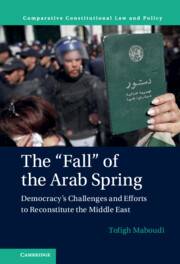Book contents
- The “Fall” of the Arab Spring
- Comparative Constitutional Law and Policy
- The “Fall” of the Arab Spring
- Copyright page
- Dedication
- Contents
- Figures
- Tables
- Acknowledgments
- Introduction
- 1 Constitutions, Civil Society, and Democratization in the Arab World
- 2 Democratizing the Parchments
- 3 Constitutional Negotiations and the Pathway to Democratic Transition
- 4 Pathways of Failure
- 5 Pathways of Failure
- 6 Pathways of Failure
- 7 Lessons from the “Fall” of the Arab Spring
- Bibliography
- Index
4 - Pathways of Failure
The Importance of the Process
Published online by Cambridge University Press: 31 March 2022
- The “Fall” of the Arab Spring
- Comparative Constitutional Law and Policy
- The “Fall” of the Arab Spring
- Copyright page
- Dedication
- Contents
- Figures
- Tables
- Acknowledgments
- Introduction
- 1 Constitutions, Civil Society, and Democratization in the Arab World
- 2 Democratizing the Parchments
- 3 Constitutional Negotiations and the Pathway to Democratic Transition
- 4 Pathways of Failure
- 5 Pathways of Failure
- 6 Pathways of Failure
- 7 Lessons from the “Fall” of the Arab Spring
- Bibliography
- Index
Summary
When and how do constitution-making processes hinder democratic transitions? Examining the Arab Spring constitutional reforms, this chapter identifies four pathways through which non-inclusive and/or nonparticipatory processes lead to either constitutional failure or democratic backsliding. The first type of process leading to failure is the “populist” process, a nondemocratic, exclusionary process identified by a majority rule (Egypt 2012). The second type is the “window-dressing” process where severely contested regimes unwilling to democratize initiate constitutional reforms which only appear inclusive or participatory by allowing a small group of moderate opposition groups to participate (e.g., Jordan 2011, Morocco 2011, Egypt 2014, and Algeria 2016). The third failed pathway is through “closed” constitution-making processes where input from the general public is not sought, nor are major interest groups and civil society organizations offered a seat at the table (Bahrain 2012, Syria 2012, Oman 2011, Saudi Arabia 2013, and Egypt 2019). The last failed pathway of constitution-making processes is “conflict” constitutions, which involves a non-inclusive process in ethnically or regionally divided nations. As the cases of Yemen (2015) and Libya (2017) show, in such circumstances the process of crafting the constitution only exacerbates the extant conflicts.
Keywords
- Type
- Chapter
- Information
- The 'Fall' of the Arab SpringDemocracy's Challenges and Efforts to Reconstitute the Middle East, pp. 113 - 159Publisher: Cambridge University PressPrint publication year: 2022

